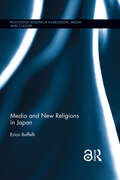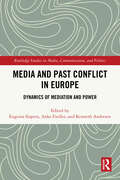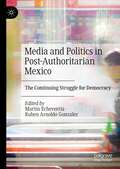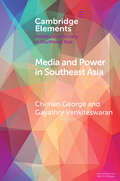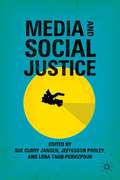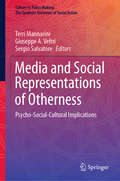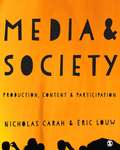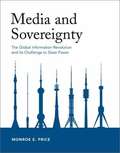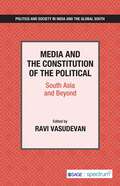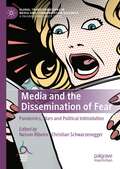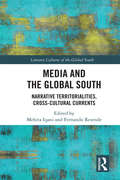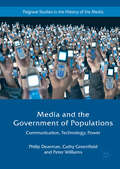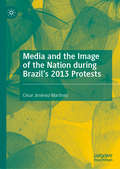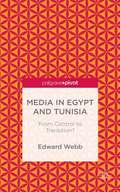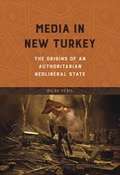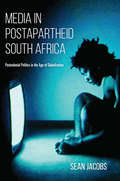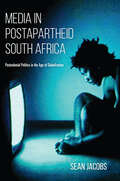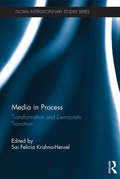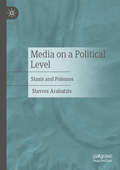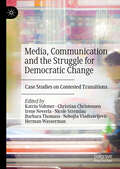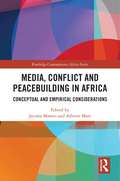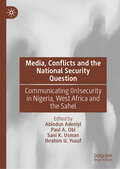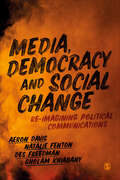- Table View
- List View
Media and New Religions in Japan (Routledge Research in Religion, Media and Culture)
by Erica BaffelliThe Open Access version of this book, available at www.taylorfrancis.com/books/9781135117849, has been made available under a Creative Commons Attribution-Non Commercial-No Derivative 4.0 license. Japanese "new religions" (shinshūkyō) have used various media forms for training, communicating with members, presenting their messages, reinforcing or protecting the image of the leader, and, potentially, attracting converts. In this book the complex and dual relationship between media and new religions is investigated by looking at the tensions groups face between the need for visibility and the risks of facing attacks and criticism through media. Indeed media and new technologies have been extensively used by religious groups not only to spread their messages and to try to reach a wider audience, but also to promote themselves as a highly modern and up-to-date form of religion appropriate for a modern technological age. In 1980s and early 1990s some movements, such as Agonshū , Kōfuku no Kagaku, and Aum Shinrikyō came into prominence especially via the use of media (initially publications, but also ritual broadcasts, advertising campaigns, and public media events). This created new modes of ritual engagement and new ways of interactions between leaders and members. The aim of this book is to develop and illustrate particular key issues in the wider new religions and media nexus by using specific movements as examples. In particular, the analysis of the interaction between media and new religions will focus primarily on three case studies predominantly during the first period of development of the groups.
Media and Past Conflict in Europe: Dynamics of Mediation and Power (Routledge Studies in Media, Communication, and Politics)
by Eugenia Siapera Kenneth Andresen Anke FiedlerFocusing on how the history of past conflicts is mediated in the present and recent past in six European countries, this book explores media processes as they intersect with power dynamics and hegemonic narratives of history and historical memory.The analysis centers around six countries that have experienced past conflict and traumatic past histories–Bosnia and Herzegovina, Cyprus, Germany, Greece, Ireland, and Kosovo–selected based on the type of conflict (emanating from WWII, authoritarian past, colonial past, interethnic conflict, or communist past) and its ongoing relevance. Focusing on the mediation of past conflict, the book revolves around the following questions: How do countries that have gone through historical trauma mediate this troubled past? How do they navigate processes of production, representation, and reception? How do journalists negotiate the competing demands of professional values, political tensions, and the emotional fallout of conflict and trauma? How do audiences/publics engage with content that may misrepresent their community or experiences? How do representations of past conflict change over time? How are the mediations of the past involved in present-day politics?Setting out in each chapter the implications of their analysis for journalistic education and practice, the book will attract readers among academics in the area of media and conflict and media and memory; students of media, communications, and journalism; and journalists who write on past conflict and commemoration, as well as those writing and researching on the six countries that form the case studies.
Media and Politics in Post-Authoritarian Mexico: The Continuing Struggle for Democracy
by Martin Echeverria Ruben Arnoldo GonzalezThis volume presents an analytical and empirical overview of the array of issues that the Mexican media faces in the post-authoritarian age, which jointly explains how a partially accomplished democracy, its authoritarian inertias, and its unintended consequences hinder the democratic performance of the media. This is analyzed from three points of view: the stalemate Mexican media system and ineffective regulations, the conditions of risk and insecurity of the journalists on the field, and the limits of freedom of expression, political substance, and inclusiveness of media content. A binational effort, with research from US and Mexican authors, a wide analytic perspective is provided on the macro, meso, and micro levels, allowing for a deep conceptual richness and a comprehensive understanding of the Mexican case. With leading researchers in the field, the volume revolves around the problems of the media in post-authoritarian democracies. By answering the questions of how and why the Mexican media has not fully democratized, the works encompassed here can resonate with and are relevant to other post-authoritarian countries and academic disciplines.
Media and Power in Southeast Asia (Elements in Politics and Society in Southeast Asia)
by Cherian George Gayathry VenkiteswaranThis study of Southeast Asian media and politics explores issues of global relevance pertaining to journalism's relationship with political power. It argues that the development of free, independent, and plural media has been complicated by trends towards commercialisation, digital platforms, and identity-based politics. These forces interact with state power in complex ways, opening up political space and pluralising discourse, but without necessarily producing structural change. The Element has sections on the democratic transitions of Indonesia, Myanmar and Malaysia; authoritarian resilience in Singapore; media ownership patterns in non-communist Southeast Asia; intolerance in Indonesia and Myanmar; and digital disruptions in Vietnam and Malaysia.
Media and Social Justice
by Sue Curry JansenThis book is an anthology of work by critical media scholars, media makers, and activists who are committed to advancing social justice. Topics addressed include but are not limited to international media activist projects such as the Right to Communication movement and its corollaries; the importance of listening and enacting policies that advance democratic media; regional and local media justice projects; explorations of the challenges the era of participatory media pose to public media; youth and minority media projects and activism; ethical dilemmas posed by attempts to democratize access to media tools; the continued marginalization of feminist perspectives in international policy venues; software freedom and intellectual property rights; video activism in both historical and contemporary contexts; internet strategies for defending dissenting voices; and five accounts by prominent scholar/activists of their lifelong struggles for media justice.
Media and Social Representations of Otherness: Psycho-Social-Cultural Implications (Culture in Policy Making: The Symbolic Universes of Social Action)
by Giuseppe A. Veltri Sergio Salvatore Terri MannariniThis book presents the main findings of an empirical exploration of media discourses on social representations of “otherness” in seven European countries. It focuses on the analysis of press discourses produced over a fifteen-year period (2000–2015) on three contemporary figures of otherness that challenge the identity of European societies, question the attitudes towards diversity, and pose significant challenges for policy-makers: immigration, Islam, and LGBT. The book provides a comprehensive and articulate map of how national media addresses such themes from both synchronic and diachronic perspectives, revealing patterns of continuity and discontinuity across time and space. Lastly, it discusses these patterns in the light of their cultural meanings and their influence on social and political collective behaviours.
Media and Society: Production, Content and Participation
by Nicholas Carah Eric Louw'This is the media and society text that critical scholars have been waiting for'. - Professor Mark Andrejevic, Pomona College This book unpacks the role of the media in social, cultural and political contexts and encourages you to reflect on the power relationships that are formed as a result. Structured around the three cornerstones of media studies; production, content and participation, this is an ideal introduction to your studies in media, culture and society. The book: Evaluates recent developments in media production, industries and platforms brought about the emergence of interactive media technologies. Examines the shifting relationship between media production and consumption instigated by the rise of social and mobile media, recasting consumption as ‘participation’. Explores the construction of texts and meanings via media representations, consumer culture and popular culture, as well as the relationship between politics and public relations. Assesses the debates around the creative and cultural labour involved in meaning-making. Includes a companion website featuring exercise and discussion questions, links to relevant blogs and web material, lists of further reading and free access to key journal articles.
Media and Society: Production, Content and Participation
by Nicholas Carah Eric LouwThis book unpacks the role of the media in social, cultural and political contexts and encourages you to reflect on the power relationships that are formed as a result. Structured around the three cornerstones of media studies; production, content and participation, this is an ideal introduction to your studies in media, culture and society. The book: Evaluates recent developments in media production, industries and platforms brought about the emergence of interactive media technologies. Examines the shifting relationship between media production and consumption instigated by the rise of social and mobile media, recasting consumption as 'participation'. Explores the construction of texts and meanings via media representations, consumer culture and popular culture, as well as the relationship between politics and public relations. Assesses the debates around the creative and cultural labour involved in meaning-making. Includes a companion website featuring exercise and discussion questions, links to relevant blogs and web material, lists of further reading and free access to key journal articles.
Media and Sovereignty: The Global Information Revolution and Its Challenge to State Power
by Monroe E. PriceHonorable Mention for the 2002 Communication Policy Research Award presented by The Donald McGannon Communication Research Center. Media have been central to government efforts to reinforce sovereignty and define national identity, but globalization is fundamentally altering media practices, institutions, and content. More than the activities of large conglomerates, globalization entails competition among states as well as private entities to dominate the world's consciousness. Changes in formal and informal rules, in addition to technological innovation, affect the growth and survival or decline of governments. In Media and Sovereignty, Monroe Price focuses on emerging foreign policies that govern media in a world where war has information as well as military fronts. Price asks how the state, in the face of institutional and technological change, controls the forms of information reaching its citizens. He also provides a framework for analyzing the techniques used by states to influence populations in other states. Price draws on an international array of examples of regulation of media for political ends, including "self-regulation," media regulation in conflict zones, the control of harmful and illegal content, and the use of foreign aid to alter media in target societies.
Media and the Constitution of the Political: South Asia and Beyond
by Ravi VasudevanThis volume features the writings of leading media scholars from South Asia and Europe on the topic of how media articulates political energies and transformational logics. The research traverses the press, newsreels, entertainment cinema, photography, television, music, social media and data-driven politics. The authors consider how media industries, institutions and practices constitute sites where conflicts relating to wider social change are observable. Authors address media materiality and aesthetics in tracking political effects and resonances on subjects such as wire photo transfers, film set design, the formal structures of the newsreel, the role of television audience surveys, the relationship between digital and paper records, the place of media in courts of law and the phenomenon of the media trial. The overall approach in understanding media and the political is not only to access formal institutions, both of media and politics but also to expand perspective to trace the wider dispersed appearance of the political in and through media.
Media and the Dissemination of Fear: Pandemics, Wars and Political Intimidation (Global Transformations in Media and Communication Research - A Palgrave and IAMCR Series)
by Christian Schwarzenegger Nelson RibeiroThis book offers a diachronical and inter-/transmedia approach to the relationship of media and fear in a variety of geographical and cultural settings. This allows for an in-depth understanding of the media’s role in pandemics, wars and other crises, as well as in political intimidation. The book assembles chapters from a variety of authors, focusing on the relation between media and fear in the West, the Middle East, the Arab World and China. Besides its geographical and cultural diversity, the volume also takes a long-term perspective, bringing together cases from transforming media environments which span over a century. The book establishes a strong and historically persistent nexus between media and fear, which finds ever-new forms with new media but always follows similar logics.
Media and the Global South: Narrative Territorialities, Cross-Cultural Currents (Literary Cultures of the Global South)
by Mehita Iqani Fernando ResendeWhat does the notion of the ‘global south’ mean to media studies today? This book interrogates the possibilities of global thinking from the south in the field of media, communication, and cultural studies. Through lenses of millennial media cultures, it refocuses the praxis of the global south in relation to the established ideas of globalization, development, and conditions of postcoloniality. Bringing together original empirical work from media scholars from across the global south, the volume highlights how contemporary thinking about the region as theoretical framework ・ an emerging area of theory in its own right ・ is incomplete without due consideration being placed on narrative forms, both analogue and digital, traditional and sub-cultural. From news to music cultures, from journalism to visual culture, from screen forms to culture-jamming, the chapters in the volume explore contemporary popular forms of communication as manifested in diverse global south contexts. A significant contribution to cultural theory and communications research, this book will be of interest to scholars and researchers of media and culture studies, literary and critical theory, digital humanities, science and technology studies, and sociology and social anthropology.
Media and the Government of Populations: Communication, Technology And Power (Palgrave Studies in the History of the Media)
by Peter Williams Philip Dearman Cathy GreenfieldThis book deals with the social, cultural and especially political significance of media by shifting from the usual focus on the public sphere and publics and paying attention to populations. It describes key moments where populations of different sorts have been subject to formative and diverse projects of governing, in which communication has been key. It brings together governmentality studies with the study of media practices and communication technologies. Chapters consider print culture and the new political technology of individuals; digital economies as places where populations are formed, known and managed as productive resources; workplaces, schools, clinics and homes as sites of governmental objectives; and how to appropriately link communication technologies and practices with politics. Through these chapters Philip Dearman, Cathy Greenfield and Peter Williams demonstrate the value of considering communication in terms of the government of populations.
Media and the Image of the Nation during Brazil’s 2013 Protests
by César Jiménez-MartínezThis book explores the struggles over the mediated construction and projection of the image of the nation at times of social unrest. Focussing on the June 2013 protests in Brazil, it examines how different actors –authorities, activists, the national media, foreign correspondents– disseminated competing versions of ‘what Brazil was’ during that pivotal episode. The book offers a fresh conceptual approach, supported by media coverage analysis and original interviews, that demonstrates the potential of digital media to challenge power structures and establish new ways of representing the nation. It also highlights the vulnerability of both ‘old’ and ‘new’ media to forms of inequality and disruption due to political interferences, technological constraints, and continuing commercial pressures. Contributing to the study of media and the nation as well as media and social movements, the author throws into sharp relief the profound transformation of mediated nationhood in a digital and global media environment.
Media in Egypt and Tunisia: From Control to Transition?
by Edward WebbThis book examines the mass media systems of Egypt and Tunisia under the pre-uprising regimes, with a focus on the last decade of the Mubarak and Ben Ali periods, as well as on how media are adapting to the political transitions underway. Findings are based on extensive interviews with journalists.
Media in New Turkey: The Origins of an Authoritarian Neoliberal State (The Geopolitics of Information)
by Bilge YesilIn Media in New Turkey, Bilge Yesil unlocks the complexities surrounding and penetrating today's Turkish media. Yesil focuses on a convergence of global and domestic forces that range from the 1980 military coup to globalization's inroads and the recent resurgence of political Islam. Her analysis foregrounds how these and other forces become intertwined, and she uses Turkey's media to unpack the ever-more-complex relationships. Yesil confronts essential questions regarding: the role of the state and military in building the structures that shaped Turkey's media system; media adaptations to ever-shifting contours of political and economic power; how the far-flung economic interests of media conglomerates leave them vulnerable to state pressure; and the ways Turkey's politicized judiciary criminalizes certain speech. Drawing on local knowledge and a wealth of Turkish sources, Yesil provides an engrossing look at the fault lines carved by authoritarianism, tradition, neoliberal reform, and globalization within Turkey's increasingly far-reaching media.
Media in Postapartheid South Africa: Postcolonial Politics in the Age of Globalization
by Sean JacobsIn Media in Postapartheid South Africa, author Sean Jacobs turns to media politics and the consumption of media as a way to understand recent political developments in South Africa and their relations with the African continent and the world. Jacobs looks at how mass media define the physical and human geography of the society and what it means for comprehending changing notions of citizenship in postapartheid South Africa. Jacobs claims that the media have unprecedented control over the distribution of public goods, rights claims, and South Africa's integration into the global political economy in ways that were impossible under the state-controlled media that dominated the apartheid years. Jacobs takes a probing look at television commercials and the representation of South Africans, reality television shows and South African continental expansion, soap operas and postapartheid identity politics, and the internet as a space for reassertions and reconfigurations of identity. As South Africa becomes more integrated into the global economy, Jacobs argues that local media have more weight in shaping how consumers view these products in unexpected and consequential ways.
Media in Postapartheid South Africa: Postcolonial Politics in the Age of Globalization
by Sean JacobsA study of mass media in twenty-first-century South Africa offering “revelations about the nature of citizenship and public engagement in our media saturated age” (Daniel R. Magaziner, author of The Law and the Prophets: Black Consciousness in South Africa , 1968–1977).In Media in Postapartheid South Africa, Sean Jacobs turns to media politics and the consumption of media as a way to understand recent political developments in South Africa and their relations with the African continent and the world.Jacobs looks at how mass media define the physical and human geography of the society and what it means for comprehending changing notions of citizenship in postapartheid South Africa. Jacobs claims that the media have unprecedented control over the distribution of public goods, rights claims, and South Africa’s integration into the global political economy in ways that were impossible under the state-controlled media that dominated the apartheid years. Jacobs takes a probing look at television commercials and the representation of South Africans, reality television shows and South African continental expansion, soap operas and postapartheid identity politics, and the internet as a space for reassertions and reconfigurations of identity. As South Africa becomes more integrated into the global economy, Jacobs argues that local media have more weight in shaping how consumers view these products in unexpected and consequential ways.
Media in Process: Transformation and Democratic Transition (Global Interdisciplinary Studies Series)
by Sai Felicia Krishna-HenselThe post-communist development of media systems has been uneven in the countries of the region. Television and newspapers, together with the emergence of social media, have had great influence on the political debate in various countries. Ownership of the media has been a factor in many instances. The integration of traditionally isolated Central/Eastern Europe into larger, worldwide trends has fundamentally changed the way we look at the media in this region. This volume proposes to address the transition of the media and communication industries in the contemporary period. The contributions discuss, among other things, the obstacles that still remain for the media to play an effective watchdog role in the new democracies, and whether the advent of the Internet and social media has helped or hindered the transformation to a powerful, independent media. The discussion further examines whether advertising agencies have targeted post-communist citizens differently than those in Western European countries and if the media markets in the post-communist region are fundamentally different than in Western Europe and North America. A second focus of the volume is the media coverage of social issues like domestic violence, which is intended to draw attention to these issues and influence policy in a more aware and open society. This establishes the trend of post-communist media following the example of western media practice. The implications of the Central European media transformation for the newly transforming media markets in the post-Soviet space suggest a new phase in the development of the medium. The impact of global influences on regional expression is an important aspect of the political and social changes that are underway. This volume makes an important interdisciplinary contribution in examining the development of the media.
Media on a Political Level: Stasis and Polemos
by Stavros ArabatzisThe volume presented here seeks to shift the concept of &“media&” from its traditional domain to the political field. Media are not merely to be understood as an intellectual or aesthetic game (communicative, linguistic, written, technical, profit-rational, instrumental, hermeneutic, or mathematical-informational), but rather as a political state of emergency. This &“media theory&” therefore addresses the question of &“why humanity, instead of entering a truly human state, is sinking into a new kind of barbarism&” (Adorno/Horkheimer). According to our thesis, this is a medial question—one that arises from the original „inverse setting&” (kata-strophen) of media—and it subsequently determines their historical, societal, social, and political development. The main thesis of this book is that we are no longer dealing with media as a theoretical, technical-aesthetic, or informational game. Rather, we are dealing with a political state of emergency, where the issue is truth or falsehood within the polis and its prevailing laws. These are two fundamentally different domains—intellectual and aesthetic play on the one hand, and political emergency on the other—that must not be confused, because the latter is existential and concerns life or death. Today, media themselves have become cultural, technical, economic, and political &“weapons,&” concealing both their &“essence&” and &“non-essence.&” As a result, the once metaphorical character of &“technicist media theory&”—&“war as the essence of media&” (Kittler)—has been lost, and media have been transferred into the political, geopolitical, financial, and informational-economic realm. Kittler&’s media-theoretical thesis (media as &“military equipment&”: media as repurposed war devices, misunderstood in their function as long as their primary military purpose is ignored) is, according to our thesis in this book, not to be understood as &“technical,&” but as political (state-related) and socio-economic (pre-state). Media theory thus becomes Stasiology (theory of civil war) and Polemology (theory of war). This antagonistic-polemical principle sharpens the focus on all media in the public sphere, such that the &“agonistic&” principle of struggle (C. Mouffe) is merely a preliminary stage and still remains within the realm of play. Therefore, our concluding thesis is that we do not need a technical, hermeneutic, aesthetic, phenomenological, anthropological, or ontological a priori to explain the essence or non-essence of media. What we need is a Stasiology and a Polemology capable of unlocking the entire antagonistic-polemical field of media in the public sphere. Only this sharpening of media in the public sphere allows us to move beyond the antagonistic-polemical principle itself.
Media, Communication and the Struggle for Democratic Change: Case Studies on Contested Transitions
by Katrin Voltmer Christian Christensen Herman Wasserman Nicole Stremlau Barbara Thomass Irene Neverla Nebojša VladisavljevićThis book investigates the role of media and communication in processes of democratization in different political and cultural contexts. Struggles for democratic change are periods of intense contest over the transformation of citizenship and the reconfiguration of political power. These democratization conflicts are played out within an increasingly complex media ecology where traditional modes of communication merge with new digital networks, thus bringing about multiple platforms for journalists and political actors to promote and contest competing definitions of reality. The volume draws on extensive case study research in South Africa, Kenya, Egypt and Serbia to highlight the ambivalent role of the media as force for democratic change, citizen empowerment, and accountability, as well as driver of polarization, radicalization and manipulation.
Media, Conflict and Peacebuilding in Africa: Conceptual and Empirical Considerations (Routledge Contemporary Africa)
by Jacinta MaweuThis book explores the role and place of popular, traditional and digital media platforms in the mediatization, representation and performance of various conflicts and peacebuilding interventions in the African context. The role of the media in conflict is often depicted as either ‘good’ (as symbolized by peace journalism) and ‘bad’ (as exemplified by war journalism), but this book moves beyond this binary to highlight the ‘in-between’ role that the media often plays in times of conflict. The volume does not only focus on the relationship between mass media, conflict and peacebuilding processes but it broadens its scope by critically analysing the dynamic and emergent roles of popular and digital media platforms in a continent where the semi-literate and oral communities still rely heavily on popular communication platforms to get news and information. Whilst social media platforms have been hailed for their assumed democratic and digital dividends, this book does not only focus on these positive aspects but also shines a light on dark forms of participation which are fuelling racial, gender, ethnic, political and religious conflicts in highly polarized and stratified societies. Highlighting the many ways in which traditional, digital and popular media can be used to both escalate conflicts and promote peacebuilding, this volume will be a useful resource for students, researchers and civil society groups interested in peace and conflict studies, journalism and media studies in different contexts within Africa.
Media, Conflicts and the National Security Question: Communicating (In)security in Nigeria, West Africa and the Sahel
by Abiodun Adeniyi Paul A. Obi Sani K. Usman Ibrahim U. YusufThis book explores how the media, and journalism in a cross-disciplinary sense, has treated conflicts in Nigeria, West Africa and the Sahel. Contributors connect theoretical foundations with practical experiences in the study of media, conflicts and national security, seeking to unravel the mediated and communication logic(s) in news coverage and analyse the media's role in pre-conflict, in-conflict and post-conflict discourses. The work maps out the impact of mediated narratives on security, risk, terrorism, banditry and general society, relying on local, on-the-spot and ontological cultural experiences in Africa, especially Nigeria, Ghana, Sierra Leone and other parts of West Africa.
Media, Democracy and Social Change: Re-imagining Political Communications
by Des Freedman Aeron Davis Natalie Fenton Gholam KhiabanyWhen we are told so regularly that we live in a ‘post truth’ age and are surrounded by ‘fake news’, it can be tempting to think of politics as primarily mediated. Discussion and analysis of public affairs is preoccupied with the power and reach of platforms or the passion and rage of social media exchanges. As important as these issues may be, a focus on the communicative risks downgrading the political. Media, Democracy and Social Change puts politics back into political communications. It shows how within a digital media ecology, the wider context of neoliberal capitalism remains essential for understanding what political communications is, and can hope to be. Tackling broad themes of structural inequality, technological change, political realignment and social transformation, the book explores political communications as it relates to debates around the state, infrastructures, elites, populism, political parties, activism, the legacies of colonialism, and more. It is both an expert introduction to the field of political communications, and a critical intervention to help re-imagine what a democratic politics might mean in a digital age. It will be essential reading for students, researchers and activists. Aeron Davis, Natalie Fenton, Des Freedman and Gholam Khiabany all work at the Department of Media and Communication at Goldsmiths, University of London, where they teach together on the MA in Political Communications.
Media, Democracy and Social Change: Re-imagining Political Communications
by Des Freedman Aeron Davis Natalie Fenton Gholam KhiabanyWhen we are told so regularly that we live in a ‘post truth’ age and are surrounded by ‘fake news’, it can be tempting to think of politics as primarily mediated. Discussion and analysis of public affairs is preoccupied with the power and reach of platforms or the passion and rage of social media exchanges. As important as these issues may be, a focus on the communicative risks downgrading the political. Media, Democracy and Social Change puts politics back into political communications. It shows how within a digital media ecology, the wider context of neoliberal capitalism remains essential for understanding what political communications is, and can hope to be. Tackling broad themes of structural inequality, technological change, political realignment and social transformation, the book explores political communications as it relates to debates around the state, infrastructures, elites, populism, political parties, activism, the legacies of colonialism, and more. It is both an expert introduction to the field of political communications, and a critical intervention to help re-imagine what a democratic politics might mean in a digital age. It will be essential reading for students, researchers and activists. Aeron Davis, Natalie Fenton, Des Freedman and Gholam Khiabany all work at the Department of Media and Communication at Goldsmiths, University of London, where they teach together on the MA in Political Communications.
